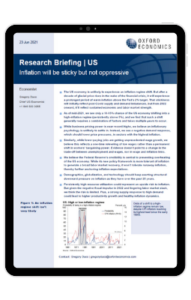US | Inflation will be sticky but not oppressive

The US economy is unlikely to experience an inflation regime shift. But after a decade of glacial price rises in the wake of the financial crisis, it will experience a prolonged period of warm inflation above the Fed’s 2% target. That stickiness will initially reflect post-Covid supply and demand imbalances, but from 2022 onward, it’ll reflect sustained economic and labor market strength.
What you will learn:
- As of mid-2021, we see only a 10-15% chance of the US economy shifting into a high-inflation regime (persistently above 5%), and we find that such a shift generally requires a combination of factors and takes multiple years to occur.
- While business pricing power is near record-highs, we believe an inflationary psychology is unlikely to settle in. Instead, we see a negative demand response, which should lower price pressures, in sectors with the highest inflation.
- Similarly, while lower-paying jobs are getting unprecedented wage growth, we believe this reflects a one-time releveling of low wages rather than a permanent shift in workers’ bargaining power.
Tags:
Related Services

Post
UK: Supply constraints are probably less prominent in the south
The extent to which UK employers can respond to likely 2024 interest rate cuts with increased output, rather than rises in prices and wages, will partly reflect the extent of spare capacity. This will inevitably vary by region. Evidence on this is imperfect, but in terms of capital assets (including intangibles) and labour availability, southern regions appear to be in a stronger position than those in the UK's traditional industrial heartland.
Find Out More
Post
Global Private equity real estate fund maturities spur asset sales
We expect the significant increases in fund maturities, spurred by capital raised over the past decade, to exert upward pressure on the rate of asset disposals as the funds approach the end of their lifecycles.
Find Out More